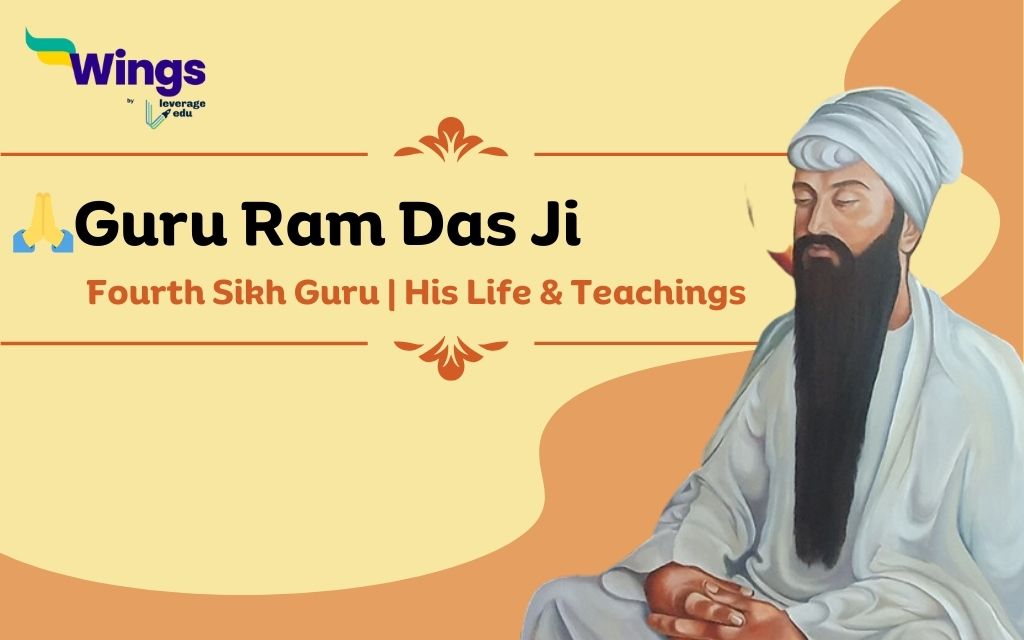Guru Ram Das Ji was the fourth Sikh Guru during the mid-16th century in India. Guru Ram Das Ji had no blood relation with the former Sikh Gurus but was chosen as the Nanak because of his service and devotion towards others. He laid the foundation of Amritsar, the centre of Sikhism and the Harmandir Sahib, or Golden Temple, which became the site of the Sikhs’ principal place of worship.
The real name of Ram Das Ji was Bhai Jetha and he served in the Mughal Court as the representative of Guru Amar Das. Guru Amar Das prepared a task for choosing his next heir among his two sons-in-law; Jetha and Ramo. The previous Sikh Gurus were; Guru Nanak, Guru Angad and Guru Amar Das Ji. Read this article to learn more about Guru Ram Das Ji and his teachings.
Also Read: List of Festivals in November 2023 in India
Guru Ram Das Ji (4th Sikh Guru)
Guru Ram Das Ji was the fourth Sikh Guru from 1574 to 1581. Before he became the Sikh Guru, he was the representative of the third Sikh Guru, Guru Amar Das Ji at the Mughal Court. When he became the Sikh Guru, he had to face hostilities for the sons of Guru Amar Das because of which he was forced to shift his base to Guru-ka-Chak, which was a newly established town, later named Ramdaspur.
In the Sikh tradition, he is remembered for expanding the Manji organisation for donation collections and clerical applications. Later on, these became important features of the Sikh religion for theological and economic support for various Sikh movements. Before his death, he appointed both his sons as the next heirs.

Guru Ram Das Ji Teachings
The Spiritual revelations and writings of Guru Ram Das Ji are known as Bani, which consists of a total of 638 holy hymns composed by Ram Das Ji in 30 different Indian classical music ragas. The sacred scripture, Guru Granth Sahib, highlights all these holy hymns, where a common message for all humankind is served; to live a life full of discipline and be thankful to the True Guru (God).
Here is one of the hymns of Guru Ram Das from the Guru Granth Sahib written on page 305:
‘One who calls himself a Sikh of the True Guru shall get up early morning and meditate on God’s Name. Bathe daily in the ambrosial pool and following the Guru’s instructions, chant Har, Har. All sins, misdeeds and negativity shall be erased.’
5 Kakaaras (Principles) of Sikhism
The five Kakaaras or Principles of Sikkhism were given by Guru Gobind Sikh in 1699. Here are all of the:
- Kes (long hair):
- Kaccha (a pair of shorts)
- Kangha (comb)
- Karha (a steel bracelet)
- Kirpan (a sword)
Related Articles
FAQs
Guru Nanak Ji was the first of the ten Sikh Gurus who established the religion of Sikkism in the late 15th century.
Guru Ram Das was the fourth Sikh Guru, who founded the city of Amritsar and laid the foundation of the Golden Temple.
Sikhism is listed among the most young religions with a history of just 500 years. The Sikh religion was founded by Guru Nanak Ji in the late 15th century.
For more information on such interesting topics, visit our trending events page and follow Leverage Edu.


 One app for all your study abroad needs
One app for all your study abroad needs












 60,000+ students trusted us with their dreams. Take the first step today!
60,000+ students trusted us with their dreams. Take the first step today!